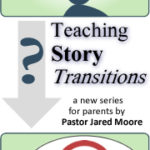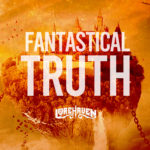Beyond Story Battles 2: Anticipating The After-world
Before Spec-Faith’s actually unplanned tag-team approach to a certain death-and/or-frivolity-obsessed controversial holiday, I’d broached a problem that seems common to many kinds of Christians — including fans of visionary stories.
It’s this: a lot of us seem to be living to Fight the Problem. We like a protest movement. Walking around with signs, figuratively or literally. Picking apart the annoying religious cultural “fundamentalist” types who either despise fiction, or else prefer only the “safe” little stories that ignore the reality of sin, the horrors of our world, or the Gospel itself.
In no way do I say these fights are bad. That would first be more of the same problem; it would also be hypocritical. This week, while looking up data for books in our SF Library, I did it again myself. I saw a review of a Christian fantasy book. It finished with this:
These books are truly good books for children. They present good morals, beliefs, values, and everything else healthy for children. With these books, you do not have to worry about what your child is reading – a rare occurrence in our world today!
Grrr. Argh. Nnnghh. Eeesh!
That’snottheonlyreasonwereadgreatnovelswhyactlikeweareonlyallowedtoread“safe”books
doyouhaveanyideahowthismakesweChristianslooktoTheWorld? (Pant, pant, pant …)
 If I kept going with that reaction, I’d be doing the same thing: basing most, or even all, of my reasons for loving and supporting Christian visionary fiction on an anti. Instead of “I don’t want objectionable ‘worldly’ stuff in my fiction” (or more likely children’s fiction), my reason would be, “I don’t want objectionable ‘safe’ stuff in my fiction.” Only one term has changed. The main reason is still Anti-ism. That’s not sustainable, and not Biblical.
If I kept going with that reaction, I’d be doing the same thing: basing most, or even all, of my reasons for loving and supporting Christian visionary fiction on an anti. Instead of “I don’t want objectionable ‘worldly’ stuff in my fiction” (or more likely children’s fiction), my reason would be, “I don’t want objectionable ‘safe’ stuff in my fiction.” Only one term has changed. The main reason is still Anti-ism. That’s not sustainable, and not Biblical.
Absolutely we find times to obey wartime instincts and fight bad guys or bad ideas. But I’d guess we have seen the results when folks confuse those means for the end. Honest Christians — especially those with backgrounds in apologetics and doctrine-debating — would admit they daily fight the drive to do only war-waging and mutate into jerks.
There’s a time for battling. A time for saying Christian fiction has room to grow out of its synthetic “safeness.” And there’s a time to push back the other way, rightfully objecting to overcorrections to the first problem in favor of another: rolling in “gritty” garbage.
But for the Christian, especially one open to wonderful, epic storytelling, there is also …
a time to kill, and a time to heal;
a time to break down, and a time to build up;[…] a time to love, and a time to hate;
a time for war, and a time for peace.Ecclesiastes 3: 3, 8
Last time was my time to declare war on constant war-declaring. Now for the peace.
Echoes in Old Earth
It wasn’t C.S. Lewis who coined the term joy or defined it as that sense of a Something Else, an awareness of awe and anticipation, that draws one to God. But it was likely Lewis who re-popularized this idea, made it more legitimate even for book-oriented Christians. If for no other reason, Lewis showed in his balance — fiction and nonfiction, apologetics and pure-fun “fairy” tales — that one can be a serious Christian, yet also go past the study, actually applying it, and go outside the library and into the world to be surrounded by very physical, beautiful things like sunshine … warm breezes … beauties.
Because all the truths about God we study, all the battles we fight, all the excesses of Christian siblings or villainies of nonbelievers, have a purpose beyond. Lewis knew that, and fleshed it out in his descriptions of “looking at” a beam of light — to contemplate it — versus “looking along” the same beam to experience it, to be illuminated, with joy.
Great stories do that. They awaken in us that emotion, but not an emotion as an end to itself or to more emotion, but based on truth — God’s truth, even if we don’t know it.
Even stories that don’t specifically include mentions of God or Christianity can awaken that feeling. Do you remember all the news stories in December 2009 to early 2010 about the number of Avatar fans (the CG blue-people movie) who were depressed because the fantastic world of Pandora only existed in special-effects render-farms, film projectors, and their own imaginations? They yearned for that elusive beauty that only exists in art and nature in this world. And suddenly it was a bit more cool to do that — even if some observers laughed at those movie fans.
I didn’t laugh. I did wish they’d take that feeling and use it to seek God, and that God would be drawing them to Himself: the only sure source of ultimate truth and beauty.
Yet I also recalled my own hints of that wonder.
 It’s the same reason I don’t stay locked up inside doing web-design or writing, but make myself walk to my office most days. It’s why even now I’m tempted to go outside and simply exult in the glories of brilliantly falling leaves, on this perfect warm autumn day that God has given to me and to everyone, saint and sinner alike (Matt. 5:45).
It’s the same reason I don’t stay locked up inside doing web-design or writing, but make myself walk to my office most days. It’s why even now I’m tempted to go outside and simply exult in the glories of brilliantly falling leaves, on this perfect warm autumn day that God has given to me and to everyone, saint and sinner alike (Matt. 5:45).
It’s why I play the same epic-sounding film soundtrack clips over and over.
It’s why I re-listen to the Lord of the Rings film score as I do this time every year.
It’s also why I long for the Christmas season again, with all its lights and gifts and candles and music … oh, the music … as much like a child as I can.
This reason, also, leads me to seek out great stories. I want not just to find new ways of being entertained, or studying truth in more-potent or “simulated” story-worlds. Stories are a special means to God Himself. They arouse in careful readers, who are humble enough to let themselves be carried like children, that feeling of Otherness.
Sometimes a story’s Other is only a blurred Something: a world, culture, hero, or a community of family and friends. Even these things can vaguely image God.
But for Christians, the reflections can be even sharper. Great stories, or music, or any other art, can bring forth emotional response, a religious affection as Jonathan Edwards would call it, that is based in beauty and truth, and drive us more to their Source: God.
Like Edwards, I am a “Christian Hedonist.” That requires clarification. I don’t at all mean pagan hedonism. It was the modern Christian author/pastor John Piper who coined that term, in Desiring God. By it Piper meant the Biblical doctrine of seeking joy in God as our reward, and doing all things accordingly. And this is not truly selfishness, because that reward should be God Himself, for whom all people are created to enjoy Him forever.
But even Piper, at times, can seem limited about the applications of Christian Hedonism. He’ll more often preach or write about more-“spiritual” approaches to seeking God’s pleasures, such as being willing to face persecution, suffer, or sacrifice comfortable lifestyles. All these are very important actions, and things God might require of us. Yet His wonders and our resultant joy in Him are revealed not only in the Bible (though this is His only sure Word!), faithful church- and Kingdom-involvement, sacrifice, or sacraments. They are revealed in any emotion that’s grounded in His revealed beauty and truth, that gives us delight in Him — even on this Old Earth.
Expecting New Earth

Great stories also point us to more than just reflections of God’s truth and beauty in this old Earth.
I think sometimes Christians forget that we don’t need to paint the values of art and storytelling in faint, pastel colors. If we choose, we can be bold. Overt. Even Earthy — because Scripture promises us not only vague happiness with God in eternity, but actual time, in space, with new bodies in a physical world: this one, remade, for everlasting life.
[A]ccording to [God’s] promise we are waiting for new heavens and a new earth in which righteousness dwells.
2 Peter 2:13
It’s to that After-world that all great visionary stories point, more than any other genre.
There all believers’ joy in Christ will be complete. There all the stories will come true, happy ending upon happy ending. We will find the source of the music. The Substance behind all the beautiful reflections. And all battles will be over. I doubt we’ll miss them.
Will we continue to have stories, though? Actual stories, fiction, in that everlasting realm? That’s another topic for another time, perhaps even next week.
But now: for which of these reasons do you love Christian visionary fiction? Partly as an anti — a reaction against “safe” nonsense or overly “spiritual” expectations? Or on your best days, do you love a great story to “get” more of our far-greater God, to enjoy Him now, and to anticipate the everlasting eras when at last we will enjoy Him completely?
Alas. For me, it’s a mixture. Thank God He’s still changing us, as characters in His Story!










































The one part of this post that leapt out at me was the reference to emotions. I have a really hard time keeping my emotions in check, just because they like to go all over the place with no restraint…but there is a time and place for that too.
You could say “anti”. Sometimes I like to say, a different perspective/approach/angle ect. We really need a new expression for ‘think outside the box’.
Because so many Christians fear so many things, they make themselves boundaries to protect themselves and their young from the boogie man, whether the boogie man is Santa Claus or Evolution or anything between. And these Christians shut themselves in and make themselves small.
But we do not need to make ourselves small. Nor in our expanding beyond silly, ‘safe’ limitations do we need to draw attention to that expansion or look upon it as a fight or act of ‘anti’. It’s exploration and discovery. Those who want to join us can. Those who won’t, well, let them stay behind.
But in our exploring and pushing beyond ‘safe’ aren’t we pressing out into deep waters of finding God or finding other fish?
Guess what I’m saying is that I look upon it as both, a push away from ‘safe’ (as defined by mere men) and a push toward ‘not a tame Lion’.
[Did any of this make sense?]
Kaye,
Yes, you make sense! Like these words of yours especially:
“But in our exploring and pushing beyond ‘safe’ aren’t we pressing out into deep waters of finding God or finding other fish?
Guess what I’m saying is that I look upon it as both, a push away from ‘safe’ (as defined by mere men) and a push toward ’not a tame Lion’.”
Loved this! From the beginning, about how we’re not defined by “anti-“s, to the whole part about fiction reflecting joy. I have thought the same thing on many occasions. Always encouraging to know I’m not the only one! We need to emphasis what we are, what God is, what being a Christian does mean: all the positive things. For one thing, it’s encouraging.
Painting truth the way it deserves to be painted is never safe, but it sure is beautiful.
Definitely not anti, but also not really looking ahead as Lewis did in The Last Battle. I think I’m going more for how God has already revealed Himself. We sometimes need to think anew to understand what’s right in front of our faces. That’s what I’m aiming at.
Becky
Stephen, I like this post. Also, I sense that I’m finally getting what you’ve been driving at: That we should be authentic in our reactions, and this means godly too of course, not just either shadow-boxing nervous Nells, or conceited about how much we ‘get’ things. We must stay close to him to walk this way.
God sees every event (story) from every angle. The more intimately we abide in Him the greater our capacity to see, wide or specific. Think of people in a circle staring at a bean in the middle. We see that everyone has an ‘anti’ ( polar opposite) and everything is related to the gradations, variations in a similarity ( neighbours in the circle). The distinctions become both less overbearing AND more intriguing, imaginative, joyful.
I also believe that every event perspective elicits an emotion in God. (Mind blowing capacity for emotion). Unlike Galadriel I struggle toallow an emotional response. If I do, identifying it is time consuming. I would cultivate the ‘Otherness’ you describe above all emotions and I wish there were another word, another spectrum of words to pass on the delight.
Today, in our Remembrance Ceremony our ancient, bent veteran stood beside our 12 year old piper (Scottish Church) as the Last post rang over our heads. What word describes the passing on of the torch? The joy, the pride, the sense of future touching past? The sense of the desperate need for the Prince of Peace?
A wave of new comments and discussions on the site is a good “problem” to have, yet that — along with the upgrades you’ve noticed — also means I have less time to interact!
Here I hope to correct for that oversight, yet it also means this will be somewhat random.
From Galadriel:
From Henrietta:
And I fall somewhere in between.
Take worship-by-singing as an example (and by that hyphenated phrase, I mean to allow for the Biblical definition of true “worship” encompassing all the good and God-glorifying things a Christian does). During songs in church, I struggle to “work up” naturally occurring emotion at how amazing God and His Story, the Gospel, truly are.
Why is that? I love those songs, their words, their messages. Maybe the words are more like theology set to music, and the “poetry” doesn’t “get” to me. Or maybe I’m simply more emotional about other kinds of music done with excellence, or other worship forms. For example, reading, or writing, on my “best” days (through Christ!) results in more naturally occurring emotion, which I hope is a response to God’s grace in my life.
The subject of emotion, and how books prompt that response in us, would make an excellent series. What kinds of emotion — Edwards’ “religious affections” — honor God? Which are cheap counterfeits of true Godward emotion? How can we balance heard and head so as to “get more” of Him? But maybe that’s one someone else can take on.
A few thoughts about Kaye‘s comment …
Very true. Yet I’d suggest the true problem here is not just making ourselves small, but making God small. We should think of ourselves as small, because we are; we were this way even before man’s freely chosen sin corrupted the world. Only in making much of God do we find ourselves, for the far greater end of “getting more” of Him.
Mm-hmm, though I’m not content simply to leave them behind. Especially if these are our Christian brothers and sisters, who would want to give up on them so easily? Sure, everyone has different callings and levels of temptations to mock/give in to, say, legalistic folks. But love would call us to keep calling them to join our journey into that revealed Mystery of our transcendent God, seen particularly in His Word, secondarily in the stories and pleasures we share even partly in a fallen universe.
I’d also give the reminder (though it’s likely mainly for myself!) that the reason to push outward — or rather, into Who God is and what He does — is not simply a desire to avoid the sad lives of stunted Christians, but to get more of God. In some ways, we can simply forget about the anti basis of rejecting the stunted folks. Yes, if they don’t want to go along, that’s their issue. Yet His love would keep us coming back to them, also.
From Becky:
Amen. And whenever we talk about exploring, going beyond, pushing the boundaries, etc., this is — or should be — based on the freedom God has already given us in His revealed Word. To go outside that isn’t just some kind of freedom we’re not supposed to have. It’s a false “freedom.” A non-freedom. An impossible-universe “freedom.” And it does seem that, as Becky wrote on Monday, some defenses of even speculative Christian stories seem to overdo the whole “hey we’re free” rhetoric. Yes, Christ gives us freedom, but freedom for a purpose: to be a “slave” to Him, in perfect joy and truth.
Any Christian story, or music, or art, should reflect that. It’s only this that gives that naturally occurring emotional response, both in head and heart, and keeps us joyful in Him in the present, yet also yearning — “groaning,” as Paul said in Rom. 8 — for the glorious future, the redeemed universe of the New Heavens and New Earth.
As always, thanks for your words, not just the ones on why we might read “unsafe” stories, but on how they can point us to God.
[…] sobre cómo las historias de fantasía pueden enriquecer nuestra fe. En particular, consulta este artículo para obtener más información sobre cómo las historias pueden indicarnos el Cielo y la Nueva […]